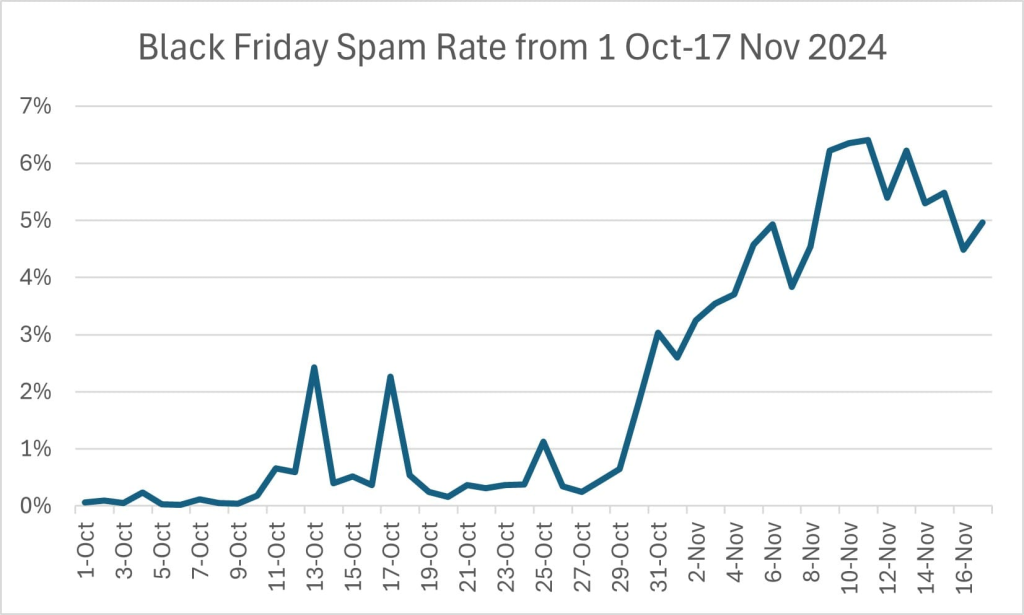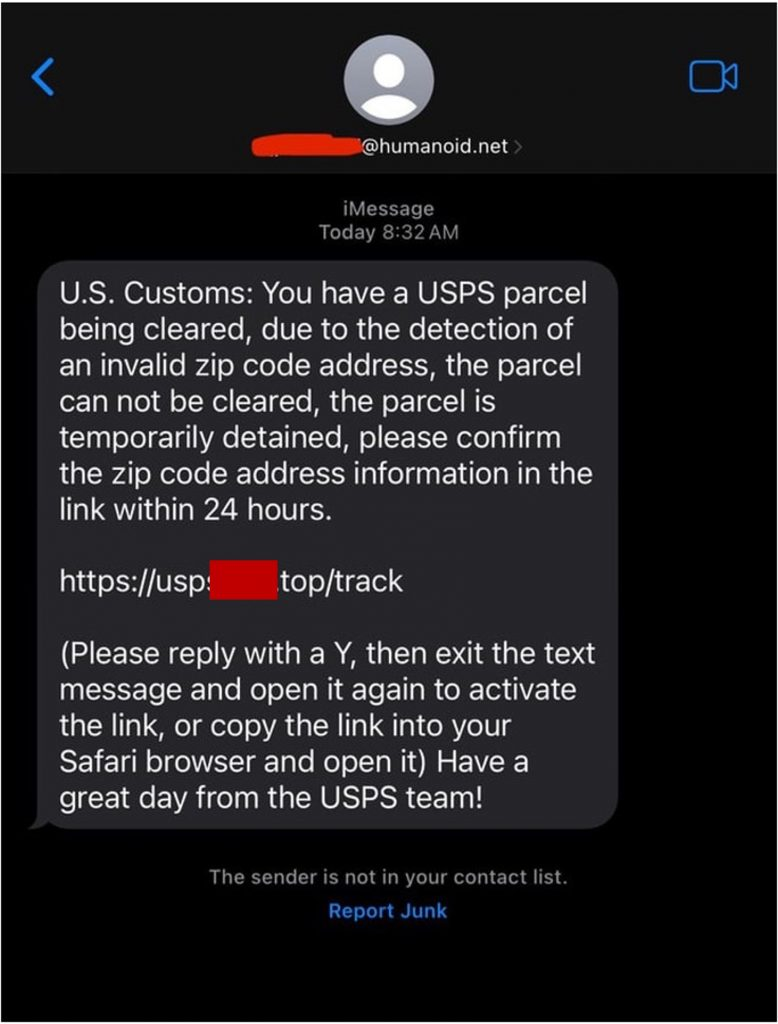Black Friday is a shopping paradise, but also a scammer’s playground. While consumers rush to grab the best deals, fraudsters are equally busy setting traps.
| What you’ll learn in this article: ● The rise of Black Friday scams ● Common Black Friday scam types ● What to do after a Black Friday fraud ● How to avoid Black Friday scams ● Bonus: Protect your store from Black Friday fraud |
Bitdefender reports that spam activity spiked sharply ahead of Black Friday, beginning in late October. Between October 1 and November 17, 2024, Black Friday‑themed spam accounted for more than 6% of all spam emails, a marked jump from early October levels. This surge mirrors the shopping season’s momentum as scammers exploit growing consumer interest in deals.

In 2024, Kaspersky blocked over 38 million phishing attacks targeting e‑commerce, banking, and payment systems, a nearly 25% increase year-over-year.
As cybercriminals get more sophisticated, scams are no longer limited to fake websites; they now span social media impersonation, non‑delivery fraud, and fake support contacts. Below are common tactics likely to dominate Black Friday scams in 2024.
Both shoppers and store owners face different types of scams during Black Friday. Here are the most common ones to watch out for.
This is a common scam that spreads widely during Black Friday, especially on social media. Scammers create fake accounts pretending to be legitimate brands and run ads offering “free appreciation gifts” to loyal customers. These posts often show high-value products and claim that buyers only need to pay the shipping fee.
In reality, victims are charged an inflated shipping cost, sometimes up to several dollars. More importantly, they are tricked into giving away personal information such as their name, phone number, address, email, and even date of birth. This data can be misused for identity theft or future phishing attacks.
Scammers frequently use shortened links posted in comment sections or sent through direct messages to lure users into clicking. These links often promise more information about a hot deal, giveaway, or product.
But instead of genuine offers, users are redirected to phishing websites or malware-laced pages designed to steal login credentials, credit card information, or install keyloggers silently. Security experts warn against clicking unfamiliar links, especially those masked by URL shorteners. Legitimate businesses rarely send promotional content via private messages or use vague link formats.

QR codes are now a popular scam tool due to how easily they can hide malicious URLs behind a simple scan. During Black Friday season, these QR codes may promise exclusive coupons or early access to flash sales.
Once scanned, they may redirect you to lookalike websites embedded with malware or phishing traps. Always double-check where a QR code leads before taking action. If a brand forces you to scan a code with no alternative way to access deals, it should raise a red flag. It’s safer to manually search for the brand’s official site in your browser.

Scammers are now abusing platforms like Shopify, WooCommerce, and BigCommerce to build fake stores that look real. These shops often clone logos, product images, and even mimic checkout pages of well-known brands.
During Black Friday, they lure buyers in with deep discounts or “too-good-to-be-true” deals. But once you pay, you might receive a counterfeit product, or nothing at all, while your personal data gets harvested for further attacks.
Some scammers pose as customer support agents from big-name brands. They use fake social media profiles to offer help and request personal information “for verification,” or ask victims to install remote desktop tools to “resolve the issue.”
This is a trap. Never grant access to your device or give away sensitive information to anyone claiming to be from customer service, especially during busy shopping periods like Black Friday.
With so many orders during Black Friday, email inboxes get flooded with tracking updates. Scammers exploit this by sending phishing emails that mimic real shipping providers. These messages often claim a delivery issue and include a link to “fix” the problem.
The links lead to fake websites that steal your login credentials or personal information. Always verify tracking numbers directly on the courier’s official website and beware of any email asking you to “verify” sensitive data.
Scammers create fake accounts impersonating verified influencers or official brand pages. These accounts run fake “Black Friday Giveaway” campaigns, encouraging users to comment, share, or click on a link to “enter.” Some even send private messages to announce you’ve “won” and ask for a shipping fee or personal details to claim the prize.
These tactics exploit trust in familiar names and urgency during holiday shopping. The result? You give away sensitive data or small payments for a prize that doesn’t exist.

Many scam websites or ads use fake countdown timers and fake “only 3 items left!” alerts to trick users into rushing decisions. These timers are designed to reset after refreshing the page or are purely cosmetic.
This tactic pressures users into buying low-quality or non-existent products without researching the seller. Always take a moment to verify the store and product authenticity, legitimate deals don’t disappear in 10 seconds.
Black Friday isn’t just dangerous for shoppers, merchants are also vulnerable. Scammers often place high-value fake orders using stolen credit cards, which later result in chargebacks and lost inventory. Others may pose as buyers, send phishing emails, or impersonate delivery partners to steal store credentials.
These attacks are often well-timed, striking when store owners are overwhelmed by traffic and processing speed. Just one misstep, clicking a fake Shopify login link or accepting a suspicious order, can lead to revenue loss or a temporary store shutdown.
During Black Friday, scammers frequently use stolen credit cards to place high-value orders, only for the payments to later be reversed as chargebacks. This leaves merchants with lost inventory and penalties from payment processors.
These attacks peak during holiday rushes when verification is lax. Merchants should implement stricter fraud checks, verify suspicious orders, and use fraud prevention tools to reduce chargeback losses.
Scammers deploy automated bots to overwhelm eCommerce stores during high-traffic periods like Black Friday. These bots can create fake accounts, scrape pricing data, flood checkout pages, or even test stolen card details.
This activity not only slows down your site but also skews analytics and increases fraud risk. Merchants can mitigate this by adding bot detection tools, CAPTCHAs, and traffic filtering before peak shopping events.
For shoppers:
If you’ve unknowingly bought from a fake store or clicked on a phishing link during Black Friday, act quickly. Start by reporting the scam to your local cybercrime authority and the platform involved (e.g., PayPal, Shopify, Meta).
Contact your bank to freeze compromised cards and watch for suspicious charges. Reset your email and shopping passwords, and enable two-factor authentication if available.
For merchants:
If your store was targeted by a scam, whether through fake orders, stolen credit cards, or phishing attacks on your admin account, take action immediately. Report the incident to your eCommerce platform and hosting provider to flag the breach. Then, reset all admin passwords, review login activity, and revoke any unknown API keys or third-party integrations.
Audit your order history for signs of bot traffic or fraudulent activity, especially during peak sale periods. To reduce future risk, enable fraud protection tools that can block suspicious behavior before damage is done. This is especially critical during Black Friday when scam attempts spike.

Understanding how Black Friday scams work and staying vigilant can protect you not only during the sale season but all year round.
One of the easiest ways to avoid scam websites is to double-check the URL before browsing. Make sure it’s the brand’s official website. For trusted online stores, consider bookmarking the site to avoid mistyped links or impersonators.
If it’s a new store or brand, do your research before clicking any links. Only interact with links you’re confident are shared from official pages or reputable sources.
When landing on a website, pay attention to red flags like odd spelling, slow load times, or strange layouts.
Always check that the site uses HTTPS and displays a padlock icon, this means the site uses SSL encryption to protect your data.
Don’t rush into a deal just because it looks too good to be true. Double-check heavily discounted items and verify that the offer is real.
Watch out for offers claiming to give away free gift cards, they’re often scams. Always review product details, seller info, and shipping policies before checking out.

Make sure the payment page is secure before entering card details. If your bank offers disposable virtual cards, use them instead of your main credit card.
Avoid wire transfers and prefer credit cards like Mastercard or Visa when shopping from trusted sources. If available, consider opting for Cash on Delivery (COD).
With the spike in holiday spending, it’s easy to overlook small fraudulent charges.
Stay alert by enabling real-time transaction alerts and reviewing your account frequently for suspicious activity.
If a price feels unrealistically low, it probably is. Compare prices from multiple sellers and avoid shops offering massive discounts with no explanation.
Stick to stores that list business details clearly, including contact info and registered company names.
If you’re a store owner, Black Friday can be a double-edged sword. While sales spike, so do risks, fake chargebacks, bots, and phishing attacks that impersonate your platform.
Stay ahead by securing your storefront early. In the next section, we’ll explore a powerful tool to help you stop these threats before they hit.
Scammers don’t just target shoppers, they also take advantage of merchants, especially during the Black Friday rush. Fake orders, stolen credit cards, bot traffic, and chargebacks can eat into your profits and hurt store reputation.
🛠️ Pro tip: If you’re running a store on Shopify or Wix, Blockify is a smart defense tool worth trying. It lets you automatically block suspicious users based on IP, geolocation, or shady browsing behavior, before they can place a fake order. Perfect for high-risk shopping seasons like Black Friday.
Conclusion
Black Friday is the ultimate shopping fest, but it also opens the floodgates for digital scammers. Whether you’re a buyer hunting for deals or a seller preparing for traffic spikes, staying informed is your first line of defense.
Recognize the red flags, use secure tools, and don’t fall for “too good to be true” offers. A smart shopper or seller is a safe one.